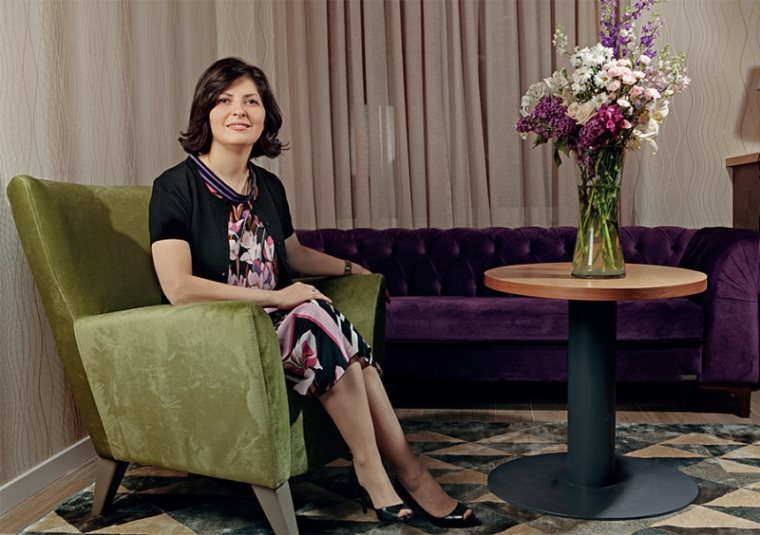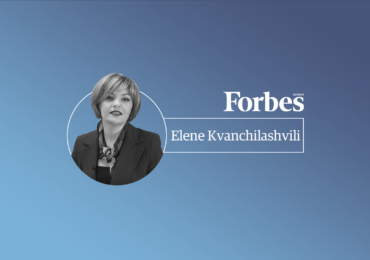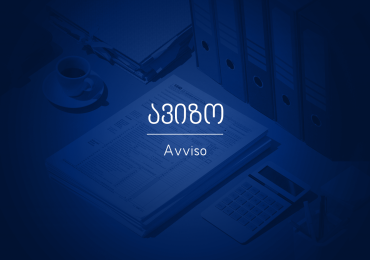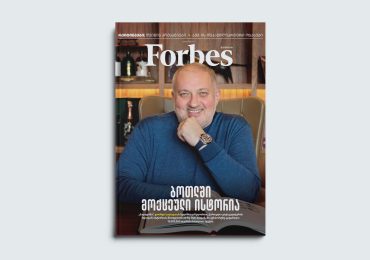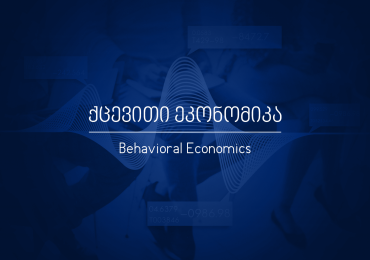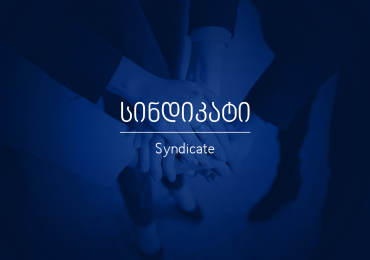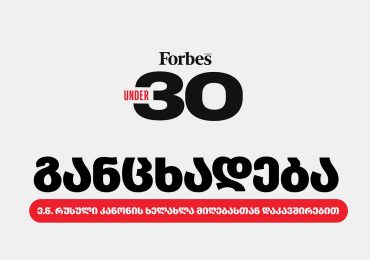With 700 million GEL in assets, the newly-rebranded Terabank has taken aim at the top-five largest banks in Georgia’s SME sector.
According to the National Bank of Georgia, between January and April of 2016, there were 19 active banks on the Georgian market, and 18 commercial banks operating on foreign capital. According to the same data, from January to April 2016, the net profit of commercial banks amounted to 180 million lari, 57% more (or 67 million GEL) than in the same period of last year. In April alone this year, bank profits reached 71 million GEL, while in April last year, it was a paltry 13 million GEL.
The individual share of profits for each bank depends on many factors.
“Financially strong founders, the right strategy, and the team – these are the main factors that count a lot for any bank. The market is changing very fast, so it’s immensely important to be able to adapt quickly. But at the same time, it is just as important not to lose your main focus and your main strategic direction,” says Thea Lortkipanidze, CEO of the newly-rebranded Terabank.
Together with the Investment Trading Group, H. H. Sheikh Nahayan Mabarak Al Nahayan (45%), H. H. Sheikh Hamdan Bin Zayed Al Nahayan (20%), H. H. Sheikh Mohamed Buti Al Hamed (15%) and H. H. Sheikh Mansur Bin Zayed Bin Sultan Al Nahayan (15%), are the main shareholders of Terabank (formerly KSB).
Our readers are well aware that the twenty-first century is overloaded with terms like branding and rebranding. Rebranding is a marketing strategy in which a new name, term, symbol, design, or combination thereof is created for an established brand with the intention of developing a new, differentiated identity in the minds of consumers, investors, competitors, and other stakeholders. Often, this involves radical changes to a brand’s logo, name, legal name, image, marketing strategy, and advertising theme. This is a very interesting and risky process if not managed by professionals.
In the case of Terabank, they sought the help of Georgian consulting agency Tara Consulting, and international branding agency Delgado, a branding company based in Spain, with 20 years’ experience in branding that includes the Georgian banking market.
Terabank has positioned itself on the local market in a way that is completely different from the others. On the one hand it is domestic, familiar and real, and on the other, it is maximally flexible with individual approaches and decisions solely oriented on offering solutions to its clients.
“Today cost effectiveness and optimization is on the agenda of many banks. So, they try to transfer their clients to distance channels and maximally-automated branch services while saving time. In doing so, they tend to drive their clients and the bank apart from each other. Naturally, we also value our clients’ time, and thoroughly developed distance channels. And of course it is also very important for us to control costs. However, we know that it is impossible to have a successful business without reliable partners, and partners cannot be found only through distance communication. For us, the clients are partners who back-up our development. Their advice helps us make the bank better each day. Our advice helps them to minimize their risks, and to operate a more successful business,” explains Lortkipanidze.
One year ago, the bank completely changed its business strategy, and turned its focus from the corporate segment to the SME segment. We asked the CEO of Terabank if she shares the widely believed opinion that this segment is riskier. Lortkipanidze had this to say in response:
“SME is the basis of the economy, and carries the same risks as the economy. We believe in the potential of this segment. Last year our SME portfolio doubled, while the bank itself grew by 50%. We think our strategy is fully justified, and this segment will continue its dynamic development,” she notes.
The main driving force behind the bank’s development is competition, which happens to be quite high and very concentrated in Georgia. Two banks make up 60% of the banking sector, and this makes it difficult for other players to secure their positions on the market.
“However, other small banks have successful business models, and this ensures that they are profitable and growing. Georgia is a small country, and niche banks have difficulty surviving. Large banks try to represent themselves on almost every market, raising the bar of competition high in every segment. While this is hard on others, it is also very good for consumers. Healthy competition is always good for everybody,” she notes.
With its GEL 500 million portfolio, Terabank ranks eighth on the market. But the bank’s future development plans are much larger in scale. Terabank is aiming for the top five banks in the SME segment. This year the bank plans to add five more branches to its already existing 18.
“The size of our branch network corresponds to our current strategy,” says Lortkipanidze, adding that the bank will review its retail strategy next year. “If we decide to be active not only in SME, but also in the retail segment, then we will definitely need more branches, ATMs and other channels,” she says.
Until then, Terabank plans to enhance its competitiveness based on a unique approach – the concept of a financial house. More precisely, the new brand environment – the place where the bank and client interact to solve issues together. This has to be a hospitable, open and cozy place. This requires frank and direct, close and self-confident communication. And the main communicator of these messages should be the brand.
Therefore, Terabank chose the combination of raspberry and green. Raspberry color stands for the emotional positioning of the brand – sensitive, inspirational and self-confident, and the green emphasizes its functional positioning – stable, responsible, caring and progressive.
Terabank’s branches are set up to put its clients at ease. The branches offer a 24 hour zone, an open space, cozy environment without barriers, separate space for retail experts, quick consultations, waiting rooms, a meeting room, a separate zone for SME and VIP clients, as well as a work space – all of these are an integral part of the bank’s new beginning.
“We believe that despite having been on the Georgian market for 17 years, this is a new beginning for the bank, and we will make it work,” Lortkipanidze explains.
However, there is no rebranding process that comes without its risks, and Terabank is no exception. Today, the bank’s success is in the hands of a team that is well-trained to understand and feel what the concept of a financial house really means.
As for the CEO, she says the staff is doing a great job.
“We know that initiating a new approach like establishing a financial house, and facilitating a closer relationship between the bank and the client is already a risk. One might ask: are we able to deal with such a challenge? Well, it’s not easy to get a client to feel at home in a bank, nor is it easy to cultivate genuinely open and friendly relations. Our staff however, has a very positive and enthusiastic attitude towards new challenges. And I am positive that we will deliver what we promised to our clients,” she says.
Lortkipanidze has a broad vision of the things that need to be in place for the banking sector to move forward. These include a stable political environment, and a steady legal base for when regulations do not change spontaneously. And “economic growth, of course, which develops businesses and let us, as financiers of these businesses, to grow as well.”
Terabank’s founders decided to invest in Georgia in 2008. As Lortkipanidze explains, Terabank’s shareholders have banking sector investments in several countries. However, the banking sector in Georgia was appealing because it is well developed, and banks generate stable growth and profits. As for regulations, shareholders have assessed them as of high standard, conservative, and at the same time, based on best practices.
“Georgia fell into investor-focus because of the country’s attractive location, its open economy, investor-friendly environment, and because of its deep reforms. This had a very quick pace in the last years. In fact, Georgia was the world’s number one reformer at one time,” says Lortkipanidze.
There’s no doubt that if any bank wants to be successful in such a competitive environment, its reputation for doing business is going to be decisive, and its relationship with its clients must be totally fair and honest.
“As in any business, in our business it is essential to work hard, be loyal to the job you are doing, and to believe that the success is always at the tip of your fingers,” says Lortkipanidze.
WHO IS THE WOMAN BEHIND TERABANK?
Thea Lortkipanidze’s whole career is interconnected with the banking sector. Her first job after graduation was that of a cashier. “I had a red diploma and big ambitions then. But I believe that having worked in this position provided me with skills that were of great use in many situations – for example, dealing with stress calmly and self-confidently,” Lortkipanidze notes.
It was difficult to work as a cashier in Tbilisi in the 1990s. It was a dark period [literally] and often times the country was without electricity.
“This was the hardest period in my career. At times I had to count sacks of devalued national currency coupons in the candlelight. There was to counting machine available, and I could not use a calculator either because of the lack of light. I had to count by hand, and nothing can make me forget the stress I went through as to not make a mistake,” Lortkipanidze recalls, as she stands on the highest rung of her career’s ladder today.
Her efforts produced results as she progressed up the career ladder –first with the operations unit and then with the credit unit.
“Working with the credit unit was very interesting experience because one can obtain information not only on a specific bank, but about the entire banking sector and the whole economy..”
This experience paved the way to her heading a risk management unit, running a leasing company associated with the bank, and then becoming the director of the risks unit.
As the CEO at Terabank, Lortkipanidze says that despite a job that entails so many different responsibilities, she feels like she is in an absolutely new dimension in the role as the number one person representing the bank.
“Even though I am at ease taking such responsibilities, and have been making decisions independently for a very long time – this was still a big challenge for me,” she admits.
Family played a big role in helping her overcome this challenge.
“Nothing makes sense without the family. My children give me the strength I need,” she says.
Terabank has set a goal to get its clients familiar with the new brand during the first month of the launch, and this not only includes loyal clients, but new consumers as well.
ARTICLE IN GEORGIAN.
THE LARGEST SHAREHOLDER OF TERABANK / His Highness Sheikh Nahayan Mabarak Al Nahayan
• His Highness Sheikh Nahayan joined the Federal Government in 1990 as the Minister of Higher Education and Scientific Research. In March 2013, he was appointed as Minister of Culture, Youth and Community Development.
• In addition to his ministerial positions, His Highness Sheikh Nahayan began working as the Chancellor of the United Arab Emirates University (1983–2013), the Chancellor of the Higher Colleges of Technology (1988–2013) and the President of Zayed University (1998–2013). He is currently the President of the General Authority for Youth and Sports (2013–present) and the President of the National Council for Tourism and Antiquities (2013–present). Sheikh Nahayan is also the President of the Future Centre for students with special needs in Abu Dhabi.
• Educated in the United Kingdom, His Highness Sheikh Nahayan Graduated from Millfield School and attended Magdalen College at Oxford University.
• Sheikh Nahayan actively chairs and supports many groups, clubs and associations. He is the chair and patron of more than 100 annual conferences and symposia, dealing with all aspects of life in the UAE, the region and the World.
• Sheikh Nahayan is the recipient of many national and international honors and awards, including the Oman Civil Order, from His Majesty Sultan Qaboos of Oman, Hilal-e-Pakistan, from the Government of Pakistan, Global Advocacy Recognition Award, from the TESOL Organization, Hamdan bin Rashid Prize for the Year’s Distinguished Person of Education, as well as many honorary degrees from several universities around the world.
TERABANK’S VISION
OUR VISION IS TO BECOME A FULL-FLEDGED COMMERCIAL BANK, THE BENCHMARK FOR EXCELLENCE IN SME BANKING AND AN ACTIVE PLAYER IN THE RETAIL BANKING SECTOR IN GEORGIA. WE ASPIRE TO BE A BANK OF CHOICE, AND A TRUSTED PARTNER FOR ENTREPRENEURS, THEIR EMPLOYEES, AND THEIR CLIENTS; A VALUABLE INVESTMENT FOR OUR SHAREHOLDERS; A PREFERRED EMPLOYER FOR OUR STAFF, AND A GOOD CORPORATE CITIZEN FOR SOCIETY.
TERABANK’S MISSION
OUR MISSION IS TO IMPROVE THE LIVES OF ENTREPRENEURS, THEIR EMPLOYEES, AND THEIR CLIENTS, BY FULFILLING THEIR BUSINESS AND PERSONAL FINANCIAL NEEDS. WE ACHIEVE THIS BY PROVIDING SOLUTIONS, EXCEPTIONAL SERVICE AND PERSONAL ATTENTION. BY SUPPORTING ENTREPRENEURS IN A RESPONSIBLE, FLEXIBLE AND EFFICIENT WAY, WE CONTRIBUTE TO THE GROWTH AND DEVELOPMENT OF THE BUSINESS SECTOR, AND THE OVERALL ECONOMY OF GEORGIA.
დატოვე კომენტარი
